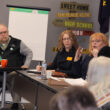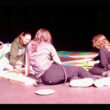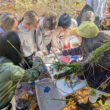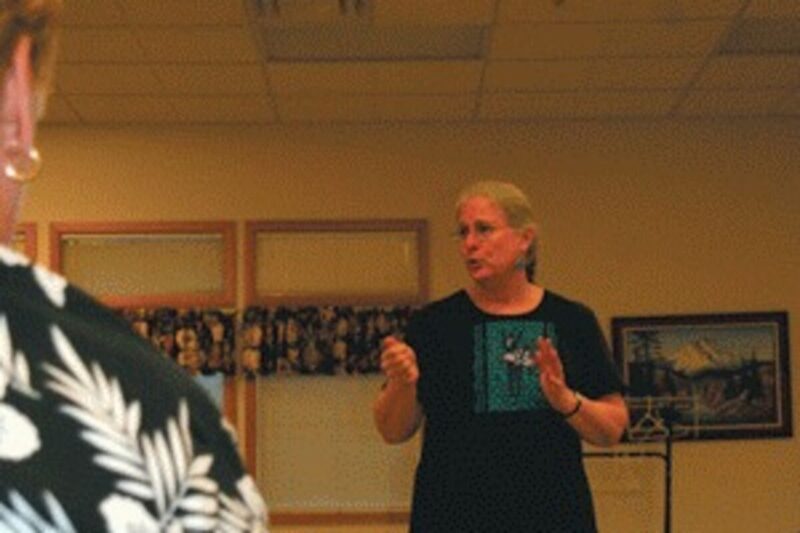Scott Swanson
Of The New Era
Children entering kindergarten should have had 1,000 hours of one-on-one reading, says Victoria Fridley, program manager for the area SMART – Start Making A Reader today – program. Many children, she said, have had zero.
Fridley spoke about the SMART program to local community members at the Sweet Home Economic Development Group’s monthly Breakfast Club, held on the last Thursday of each month at the Community Center.
She said the program provides one-on-one reading help for children in kindergarten through third grade in 10 schools in Linn County, including two, Holley and Hawthorne, in Sweet Home. Fridley said she is discussing the possibility of adding Foster to the list.
“We’re trying to serve 44 children this year in Sweet Home,” she said.
Schools in which 40 percent or more of the children are eligible for free or reduced lunches are potential SMART schools, she said.
SMART was founded in 1992 as a nonprofit program to provide adult volunteers to read to or with students who were having difficulty with literacy. The program, supported entirely by private or corporate donations, served 306 Linn County students last year.
The $300 cost per student for a year of SMART pays for an on-site coordinator, who is Grace Ford in Sweet Home, background checks for volunteers and books. Each student is given 14 books a year and, Fridley said, for most of them the book giveaway days are a big deal.
SMART sessions are held once a week in a cafeteria, school library, hallway or spare room between October and May. Volunteers, many of whom are employees of businesses that allow them time off for SMART, sit with students and listen to them read or read to them. Fridley said SMART’s emphasis is that volunteers be cheerful and supportive of students, in an effort to create a trust that many of the children do not have toward adults.
“Many of these kids don’t trust adults,” she said. “They’ve had adults disappoint them.
“When you see the impact on kids (from SMART), it’s really magical. You can walk in and see the connection between an adult and a child.”
Fridley said employees who volunteer but are out of town on occasion can arrange to have a backup who will step in for them – often a spouse or a coworker. Many children accept and develop a relationship with those people too. Consistency is critical, she said.
She said volunteers report benefiting almost as much as the children they are helping.
“Corporate volunteers tell me it’s the highlight of their work week,” she said. “They come back energized. They’re really finding it meaningful.”
Fridley cited examples of students whom the organization has tracked down later and discovered that they have done well in academics after their SMART experience.
“We discovered one young woman because she reads for us now,” she said. “She’s a student at Oregon State University.”
That young woman had a “workaholic” mother and an alcoholic stepfather, and is the only one of her family who has gone on to college, Fridley said.
“She basically has said that she never would be in college today if not for SMART.”
A SMART coordinator ran into another alum working in a bank in Wilsonville. As a boy, his family was on food assistance and his mother told SMART coordinators that the family used the books her son received from SMART for family reading time.
He is now “a very fine actor” who is attending Western Oregon University, where he is studying literature and theater, she said.
Independent studies of the short- and long-term results of the program indicate that SMART students significantly outperform comparable students after a year in the program and those improvements continue into middle school. Tests of eighth-graders who were involved in SMART showed that they were nearly three times as likely to meet the Oregon reading benchmark than students who did not have SMART tutoring.
Fridley said that the biggest restraints on SMART’s expansion is finances and the need to recruit more volunteers.
She said that other states have expressed interest in the program, which is unique to Oregon, and she expects it to eventually expand beyond the state’s borders.
Fridley said SMART’s impact can be summarized by a drawing that a child she was reading with last year produced. It showed two “huge” heads (“The larger one was me,” she said), with huge smiles on their faces.
“He said he loved SMART because, he said, I was nice to the children and read them good books,” Fridley said.
“Children really blossom under that kind of attention. It is a joyful experience to read.”
For information about volunteering or contributing to SMART, visit http://www.getsmartoregon.org or call (541) 754-4903.





